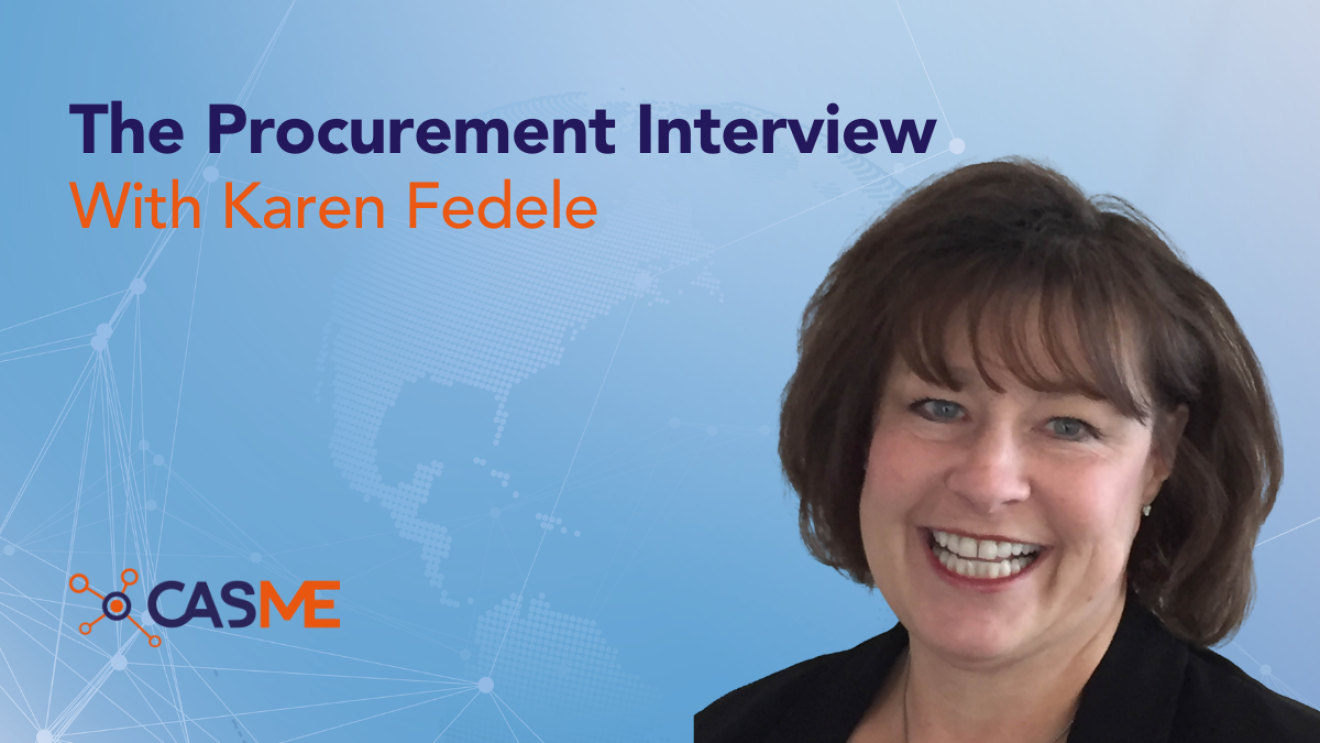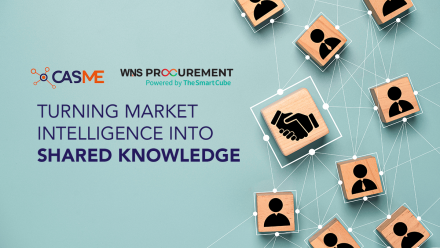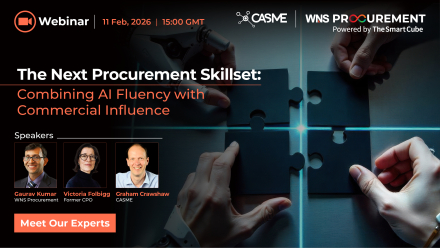
Karen Fedele has over 40 years of supply management experience across pharmaceutical, consumer goods, and technology sectors. She has led global strategic sourcing initiatives, improved procurement processes, and holds certifications such as CPSM and CPSD from ISM, along with MCIPS membership. Karen facilitates CASME events in the North America region. Here she reveals how she discovered a passion for procurement and the challenges it offers, why it shouldn’t be perceived as a backroom function, and the importance of paying it forward to honour those who have positively influenced your journey.
1) How did you get into Procurement?
I wish I could say that my career in Procurement was planned, something that I dreamed of as a small child, but it wasn’t. I was several months away from graduation with a dual major bachelor’s degree in Operations Management and Marketing Logistics, and not sure what I wanted to do with my life. There was a role in Procurement posted in the on-campus recruiting centre. I thought what could be better than being compensated to spend someone else’s money? I applied for the role which was an internship in a procurement rotation programme - that allowed me to see various parts of the business, handling a variety of categories. I learned that there was so much more to procuring for an organisation versus buying goods or services for personal use. It was the multiple facets of professional procurement that prompted me to build a career in Procurement.
What excited me about Procurement was the challenge!
- Building consensus with multiple stakeholders, such as Finance, Legal and the business, creating category strategies, and executing negotiation plans to enable acquiring goods and services in the most cost-effective way
- Negotiating complex contracts and agreements that protected my stakeholders and the organisation
- Maintaining relationships with the organisation’s suppliers, monitoring their performance and correcting deficiencies and issues that arose.
2) What has been the biggest challenge of your career?
I don’t think that there is a single event that I could point to as being the biggest challenge of my career, as there have been many, but rather a series of challenges connected by a common theme - those that provided me with an opportunity to create something that didn’t exist rather than to maintain what was already in place.
These creative challenges provided me with an opportunity for:
- Innovation: Implementing new ideas, concepts, solutions – a better and newer way to do the job
- Creativity: Maybe not the best choice of a word for a role that is bound by policy, rules and regulations, but designing new systems, processes and policies involves a bit of creativity, within acceptable limits of course
- Continuous improvement: Evaluating the existing processes and identifying ways to make them better and more efficient
- Competitive advantage: By finding ways to leverage buying power such as economies of scale, simplifying requirements and standardisation, to create a competitive edge and set ourselves apart from others and improve the company’s operating margins
- Personal satisfaction: Creating something new allowed me to leave a meaningful impact and my own mark on the organisation.
3) What has been the most significant success of your career, and why?
The most significant success for me was building a Procurement Centre of Excellence (CoE); not once, but twice. Designing the Procurement CoE meant I applied my experience from all of my prior roles, and required an understanding of a broad range of categories, both direct and indirect. I had the opportunity to define the Centre’s vision and objectives, along with analysing the current state in order to develop a strategy to achieve the future state. Creating systems, policies, processes and procedures that enabled the Procurement team to excel, along with measuring the team’s performance to identify areas for future improvement, was critical to the success of the Procurement CoE.
4) How do you think we could get more younger people interested in Procurement?
By changing the perception of procurement and supply management, more people will choose a career in Procurement. This isn’t a backroom function, where unskilled people land by chance because they don’t have a place elsewhere in the organisation. This is a function that adds value to the business. Whether we like it or not, our legacy will always be the responsibility to deliver cost reductions. One of my favourite metrics is the comparison of cost savings with the required increase in sales to equal that amount. Assuming a company’s net profit is 8%, a monetary saving of 100 equates to 1,250 in increased sales; so Procurement has a direct impact on an organisation’s financial performance.
It’s time for us to think of Procurement as a destination career because:
- Procurement is strategic, not transactional. We’re no longer just placing purchase orders without looking for opportunities for negotiation, innovation, contract management and improved total cost of ownership
- The opportunities for professional growth and advancement are limitless, as the demand for skilled procurement professionals grows and the number of universities offering degrees in supply management to meet this demand is increasing
- Procurement plays a critical role in managing risk, whether that risk is operational such as a natural disaster or a cybersecurity breach, or one that is a financial, reputational, legal or compliance risk
- A career in Procurement is exciting. No two days are ever the same, because we collaborate with a wide network of suppliers and stakeholders, solving problems and overcoming challenges.
5) What advice would you give to someone starting a Procurement career?
Understand the difference between a request that is a stretch for you to reach, versus one that sets you up for failure.
For me, stretching yourself means setting goals or a challenge that pushes you outside of your comfort zone and requires you to develop new skills. Taking a calculated risk enables you to grow personally and professionally by achieving what you haven’t previously accomplished or thought possible. The scenarios where I learned and grew the most were the ones that felt the most uncomfortable.
Setting yourself up for failure is setting unrealistic or unattainable goals without considering the necessary resources, time, or skills required to achieve them or accepting a request that requires you to compromise your values, morals, ethics or policies, or those of the organisation. It’s fine to say ‘No’ in these scenarios and to feel comfortable with the decision.
Know your strengths, weaknesses, and limitations. Set goals that are challenging enough to fuel growth, but also within reach. You own your destiny and are solely responsible for your career, and your personal and professional development.
6) Finally, putting Procurement aside (just for a moment), what inspires and motivates you?
Helping people to be the best version of themselves. One of the most rewarding things for me is the opportunity to give back and pay it forward. There is nothing more fulfilling than making a positive impact on someone else’s life. I’m very much an extrovert and enjoy the personal connection and sense of purpose that comes from engaging with others, even if it’s something as basic as a simple act of kindness. There are many people who have helped me along the way, and I will never have an opportunity to repay them. The only way I can honour their contributions to my life, is to pay it forward.
Back to News



